This content originally appeared on Democracy Now! and was authored by Democracy Now!.
This post was originally published on Radio Free.
This content originally appeared on Democracy Now! and was authored by Democracy Now!.
This post was originally published on Radio Free.
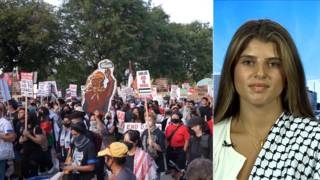
The U.S. presidential election is just 45 days away, and for antiwar voters, the policy differences between the two leading candidates are vanishingly thin. As the Biden-Harris administration continues to supply billions of dollars in military aid to Israel, the Uncommitted National Movement, which for months has attempted to steer the Democratic Party toward a more critical stance on Israel, has announced it is not endorsing Kamala Harris. Neither does the organization recommend casting a third-party vote, citing the risk of splitting the two-party vote and ushering in a second term for Donald Trump. “We were not met in good faith with our policy demands,” says the Uncommitted National Movement’s co-founder Lexis Zeidan about its attempts to parley with the Harris campaign. Zeidan says the organization will continue to pressure Democrats from within and outside of the party. “What we’re asking is not outrageous.”
This content originally appeared on Democracy Now! and was authored by Democracy Now!.
This post was originally published on Radio Free.
This content originally appeared on Democracy Now! and was authored by Democracy Now!.
This post was originally published on Radio Free.
This content originally appeared on Democracy Now! and was authored by Democracy Now!.
This post was originally published on Radio Free.
This content originally appeared on Democracy Now! and was authored by Democracy Now!.
This post was originally published on Radio Free.
This content originally appeared on Democracy Now! and was authored by Democracy Now!.
This post was originally published on Radio Free.
This content originally appeared on Democracy Now! and was authored by Democracy Now!.
This post was originally published on Radio Free.
This content originally appeared on Democracy Now! and was authored by Democracy Now!.
This post was originally published on Radio Free.

As Republican presidential nominee Donald Trump and running mate JD Vance continue to spread debunked, racist lies that Haitians living in Springfield, Ohio, are eating people’s pets, we speak with Guerline Jozef from the Haitian Bridge Alliance, an immigrant advocacy group, about threats of violence that have forced closures and evacuations at hospitals, colleges and City Hall in Springfield, with some threats citing anger over the city’s resettlement of Haitian immigrants. This comes as Trump continues to promise mass deportations if he is reelected, starting in Springfield, even though the Haitians there were welcomed under the Temporary Protected Status program.
This content originally appeared on Democracy Now! and was authored by Democracy Now!.
This post was originally published on Radio Free.
This content originally appeared on Democracy Now! and was authored by Democracy Now!.
This post was originally published on Radio Free.
This content originally appeared on Democracy Now! and was authored by Democracy Now!.
This post was originally published on Radio Free.
This content originally appeared on The Grayzone and was authored by The Grayzone.
This post was originally published on Radio Free.
This content originally appeared on Democracy Now! and was authored by Democracy Now!.
This post was originally published on Radio Free.
This content originally appeared on Democracy Now! and was authored by Democracy Now!.
This post was originally published on Radio Free.
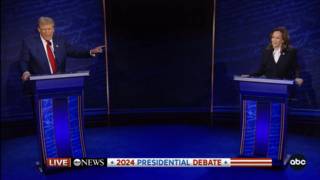
Tuesday night’s presidential debate between Kamala Harris and Donald Trump focused heavily on abortion rights and the aftermath of the Supreme Court’s 2022 Dobbs decision that overturned Roe v. Wade. Trump repeated his false claim that Democrats support infanticide, and claimed that allowing individual states to set their own laws on abortion was an improvement. Harris highlighted the risk to pregnant people now navigating a patchwork of laws and restrictions in the U.S. and promised to restore protections for reproductive rights as president. “Kamala Harris was finally out there channeling the outrage and the profound sense of violation that many people across this country feel in the wake of the Dobbs decision,” says Amy Littlefield, the abortion access correspondent for The Nation.
This content originally appeared on Democracy Now! and was authored by Democracy Now!.
This post was originally published on Radio Free.
This content originally appeared on Democracy Now! and was authored by Democracy Now!.
This post was originally published on Radio Free.
This content originally appeared on Democracy Now! and was authored by Democracy Now!.
This post was originally published on Radio Free.
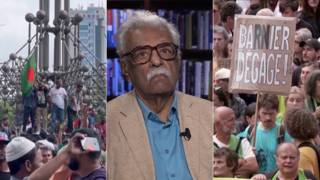
We speak to acclaimed historian, activist and filmmaker Tariq Ali about Western governments’ support for Israel’s war on Gaza and popular protest in support of Palestine, which Ali calls the “biggest divide we’ve seen in politics almost since the Vietnam War.” He argues that this division is “challenging the very nature of democracy” and the international rule of law. Ali also shares his analysis of South Asian politics — in Pakistan, where former Prime Minister Imran Khan has accused the United States of engineering his ouster, and in Bangladesh, where a student-led uprising recently toppled the authoritarian regime of its former Prime Minister Sheikh Hasina. Finally, we cover developments in Europe. In France, President Emmanuel Macron has appointed conservative leader Michel Barnier as prime minister, despite the electoral gains of the country’s left-wing coalition. This comes as far-right and anti-migrant sentiment spreads throughout the Global North.
This content originally appeared on Democracy Now! and was authored by Democracy Now!.
This post was originally published on Radio Free.


General Motors HQ, Detroit. Photo: Jeffrey St. Clair.
The evidence suggests that empires often react to periods of their own decline by over-extending their coping mechanisms. Military actions, infrastructure problems, and social welfare demands may then combine or clash, accumulating costs and backlash effects that the declining empire cannot manage. Policies aimed to strengthen empire—and that once did—now undermine it. Contemporary social changes inside and outside the empire can reinforce, slow, or reverse the decline. However, when decline leads leaders to deny its existence, it can become self-accelerating. In empires’ early years, leaders and the led may repress those among them who stress or merely even mention decline. Social problems may likewise be denied, minimized, or, if admitted, blamed on convenient scapegoats—immigrants, foreign powers, or ethnic minorities—rather than linked to imperial decline.
The U.S. empire, audaciously proclaimed by the Monroe Doctrine soon after two independence wars won against Britain, grew across the 19th and 20th centuries, and peaked during the decades between 1945 and 2010. The rise of the U.S. empire overlapped with the decline of the British empire. The Soviet Union represented limited political and military challenges, but never any serious economic competition or threat. The Cold War was a lopsided contest whose outcome was programmed in from its beginning. All of the U.S. empire’s potential economic competitors or threats were devastated by World War II. The following years found Europe losing its colonies. The unique global position of the United States then, with its disproportional position in world trade and investment, was anomalous and likely unsustainable. An attitude of denial at the time that decline was all but certain morphed only too readily into the attitude of denial now that the decline is well underway.
The United States could not prevail militarily over all of Korea in its 1950–53 war there. The United States lost its subsequent wars in Vietnam, Afghanistan, and Iraq. The NATO alliance was insufficient to alter any of those outcomes. U.S. military and financial support for Ukraine and the massive United States and NATO sanctions war against Russia are failures to date and are likely to remain so. U.S. sanctions programs against Cuba, Iran, and China have failed too. Meanwhile, the BRICS alliance counteracts U.S. policies to protect its empire, including its sanctions warfare, with increasing effectiveness.
In the realms of trade, investment, and finance, we can measure the decline of the U.S. empire differently. One index is the decline of the U.S. dollar as a central bank reserve holding. Another is its decline as a means of trade, loans, and investment. Finally, consider the U.S. dollar’s decline alongside that of dollar-denominated assets as internationally desired means of holding wealth. Across the Global South, countries, industries, or firms seeking trade, loans, or investments used to go to London, Washington, or Paris for decades; they now have other options. They can go instead to Beijing, New Delhi, or Moscow, where they often secure more attractive terms.
Empire confers special advantages that translate into extraordinary profits for firms located in the country that dominates the empire. The 19th century was remarkable for its endless confrontations and struggles among empires competing for territory to dominate and thus for their industries’ higher profits. Declines of any one empire could enhance opportunities for competing empires. If the latter grabbed those opportunities, the former’s decline could worsen. One set of competing empires delivered two world wars in the last century. Another set seems increasingly driven to deliver worse, possibly nuclear world wars in this century.
Before World War I, theories circulated that the evolution of multinational corporations out of merely national mega-corporations would end or reduce the risks of war. Owners and directors of increasingly global corporations would work against war among countries as a logical extension of their profit-maximizing strategies. The century’s two world wars undermined those theories’ appearance of truth. So too did the fact that multinational mega-corporations increasingly purchased governments and subordinated state policies to those corporations’ competing growth strategies. Capitalists’ competition governed state policies at least as much as the reverse. Out of their interaction emerged the wars of the 21st century in Afghanistan, Iraq, Syria, Ukraine, and Gaza. Likewise from their interaction, rising U.S.-China tensions emerged around Taiwan and the South China Sea.
China presents a unique analytical problem. The private capitalist half of its hybrid economic system exhibits growth imperatives parallel to those agitating economies where 90–100 percent of enterprises are private capitalist in organization. The state-owned-and-operated enterprises comprising the other half of China’s economy exhibit different drives and motivations. Profit is less their bottom line than it is for private capitalist enterprises. Similarly, the Communist Party’s rule over the state—including the state’s regulation of the entire Chinese economy—introduces other objectives besides profit, ones that also govern enterprise decisions. Since China and its major economic allies (BRICS) comprise the entity now competing with the declining U.S. empire and its major economic allies (G7), China’s uniqueness may yield an outcome different from past clashes of empires.
In the past, one empire often supplanted another. That may be our future with this century becoming “China’s” as previous empires were American, British, and so on. However, China’s history includes earlier empires that rose and fell: another unique quality. Might China’s past and its present hybrid economy influence China away from becoming another empire and rather toward a genuinely multipolar global organization instead? Might the dreams and hopes behind the League of Nations and the United Nations achieve reality if and when China makes that happen? Or will China become the next global hegemon against heightened resistance from the United States, bringing the risk of nuclear war closer?
A rough historical parallel may shed some additional light from a different angle on where today’s class of empires may lead. The movement toward independence of its North American colony irritated Britain sufficiently for it to attempt two wars (1775–83 and 1812–15) to stop that movement. Both wars failed. Britain learned the valuable lesson that peaceful co-existence with some co-respective planning and accommodation would enable both economies to function and grow, including in trade and investment both ways across their borders. That peaceful co-existence extended to allowing the imperial reach of the one to give way to that of the other.
Why not suggest a similar trajectory for U.S.-China relations over the next generation? Except for ideologues detached from reality, the world would prefer it over the nuclear alternative. Dealing with the two massive, unwanted consequences of capitalism—climate change and unequal distributions of wealth and income—offers projects for a U.S.-China partnership that the world will applaud. Capitalism changed dramatically in both Britain and the United States after 1815. It will likely do so again after 2025. The opportunities are attractively open-ended.
This article was produced by Economy for All, a project of the Independent Media Institute.
The post The Decline of the U.S. Empire: Where Is It Taking Us All? appeared first on CounterPunch.org.
This content originally appeared on CounterPunch.org and was authored by Richard D. Wolff.
This post was originally published on Radio Free.
The Committee to Protect Journalists joined the nonpartisan human rights organization, Human Rights First, with over 90 press freedom and advocacy groups in expressing deep concern over the U.S. government’s declining response to international human rights and corruption violations in a September 5, 2024 letter.
The signatories urged the Departments of State and Treasury to prioritize the effective use of Global Magnitsky sanctions, a human rights and anticorruption accountability tool that authorizes sanctions under the Global Magnitsky Human Rights Accountability Act.
Read the full letter here.
This content originally appeared on Committee to Protect Journalists and was authored by Committee to Protect Journalists.
This post was originally published on Radio Free.
This content originally appeared on Democracy Now! and was authored by Democracy Now!.
This post was originally published on Radio Free.
This content originally appeared on Democracy Now! and was authored by Democracy Now!.
This post was originally published on Radio Free.
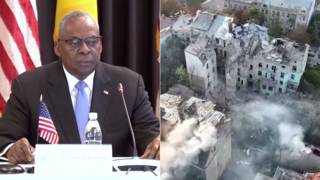
Defense Secretary Lloyd Austin has announced more U.S. aid for Ukraine just days after the country was hit by one of the deadliest airstrikes since Russia’s invasion in early 2022. On Tuesday, a pair of Russian missiles struck a military academy and hospital in the central Ukrainian city of Poltava, killing at least 51 people and injuring more than 270. “The sense … is that the U.S. is giving Ukraine enough so that it doesn’t lose, but not enough so that it can actually make significant and needed gains,” says award-winning journalist Arwa Damon, who is in Ukraine providing medical and mental healthcare with her organization INARA, the International Network for Aid, Relief and Assistance. “This has been going on for well over two years right now, and they really want to begin to be able to see a way out.”
This content originally appeared on Democracy Now! and was authored by Democracy Now!.
This post was originally published on Radio Free.
This content originally appeared on Radio Free Europe/Radio Liberty and was authored by Radio Free Europe/Radio Liberty.
This post was originally published on Radio Free.
This content originally appeared on Democracy Now! and was authored by Democracy Now!.
This post was originally published on Radio Free.
This content originally appeared on Democracy Now! and was authored by Democracy Now!.
This post was originally published on Radio Free.
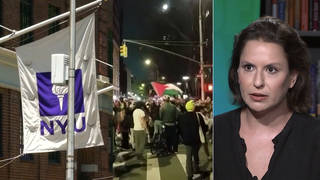
As the fall term gets underway for students across the United States, we speak with journalist and academic Natasha Lennard about how college administrators are attempting to quash Gaza solidarity actions following mass protests at campuses across the country in the spring. One example is New York University, which recently updated its student policy to make criticisms of Zionism potentially punishable under its anti-discrimination rules. “It’s extremely dangerous,” says Lennard, who teaches at The New School. “It performs de facto apologia for Israel, and to have that put into writing by a university so clearly is just open for further abuses.”
This content originally appeared on Democracy Now! and was authored by Democracy Now!.
This post was originally published on Radio Free.
This content originally appeared on Democracy Now! and was authored by Democracy Now!.
This post was originally published on Radio Free.
This content originally appeared on Democracy Now! and was authored by Democracy Now!.
This post was originally published on Radio Free.
This content originally appeared on Democracy Now! and was authored by Democracy Now!.
This post was originally published on Radio Free.